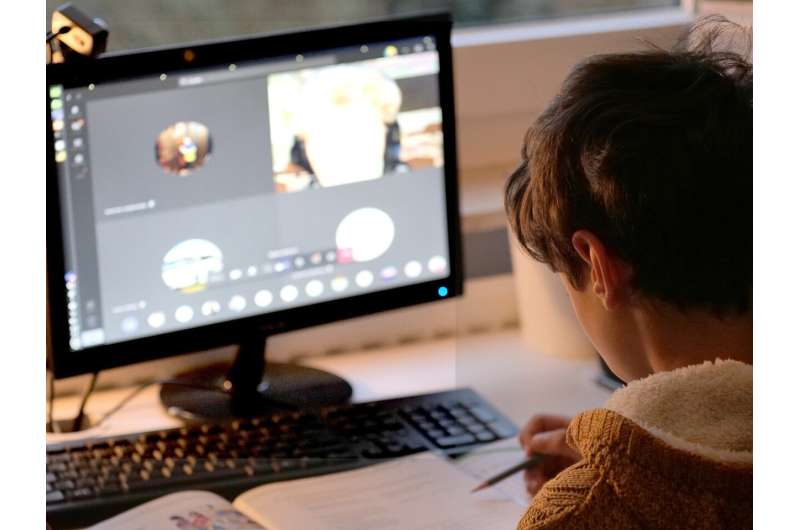Collective effort is needed to help children thrive following exposure to online risks

Helping children become more “digitally resilient” must be a collective effort if they are to learn how to thrive online, according to new research led by the University of East Anglia. The work is published in Education and Information Technologies.
Digital resilience is the capability to learn how to recognize, manage and recover from online risks—such as bullying and inappropriate content—and has the potential to buffer how these experiences may impact young people’s well-being. Until now, research has not examined how digital resilience can be built and shown by children beyond focusing on the individual child.
This new study argues that activating digital resilience needs to be undertaken as a “collective endeavor,” involving the child, their parents/caregivers within home environments, youth workers, teachers, and schools at a community level, along with governments, policymakers, and internet corporations at a societal level.
It finds that digital resilience operates across these different levels, which are critical to help children learn how to recognize, manage, recover, and depending on the support available, grow following experiences of online risks.
Importantly, these levels and areas are not mutually exclusive when it comes to digital resilience, but reinforce and operate on each other. As a result, say the researchers, collective responsibility must be at the heart of work in this area.
The study focused on digital resilience among pre-teens—those aged 8 to 12 years old, who are transitioning into early adolescence and seeking more independence at home, school, within society, and increasingly, through online experiences.
The findings come as the latest draft of the Online Safety Bill makes its way through the UK Parliament. The Bill is not expected to place a clear requirement on platforms to cooperate on cross-platform risks and respond to cross-platform harms when discharging their safety duties, compromising the collective endeavor being called for in the study.
Current United Kingdom Council for Internet Safety (UKCIS) guidance highlights digital resilience at an individual level. The study’s lead author Dr. Simon P. Hammond said this places emphasis on the child, “marginalizing how home, community and societies support children to learn how to navigate and grow from risky online experiences.”
“The need to support children in learning how to recognize, manage, and recover from online risks is an increasingly important process for all,” said Dr. Hammond, a lecturer in the School of Education and Lifelong Learning at UEA.
“By showing how digital resilience operates within and across different levels, we can provide more child-centered support to help children to thrive online. To raise digitally resilient citizens, we need to think beyond solely the child or their immediate family and think about how community and society work with these groups. There is also the idea here that just as with the offline world, we need to understand that learning by doing, which involves risky play, is a lifelong process. Mistakes will happen and children need support to learn from those.”
Consultant child and adolescent psychiatrist Dr. Richard Graham, who co-chaired the UKCIS Digital Resilience Working Group, said, “This important, hopeful research takes further the early thinking on digital resilience and gives a clear direction away from simplistic e-safety strategies, and highlights how individuals, families, and communities can flourish in the digital age. There is a clear call to action for us all to be better engaged with young people as they learn to navigate the mercurial online world, whilst not dispensing with our growing demands that technology companies create safer online spaces, more supportive of well-being and development.”
Since summer 2021, England’s nine million school pupils have been learning about being safer online via Personal, Social, Health and Economic (PSHE) education. However, many existing resources, which lack a solid evidence base, tend to take a universal rather than personalized approach to risk.
The study provides a platform to counter this by underpinning the creation of validated psychometric measures that will enable important contextual factors such as a child’s family and community support to be considered, enabling educators to offer tailored as opposed to one-size-fits-all approaches.
Co-author Dr. Gianfranco Polizzi, of the University of Liverpool, said, “Our findings have the potential to help parents/caregivers and educationalists promote digital resilience through formal and informal educational approaches that interact and show the importance of supporting pre-teens’ digital resilience within and across different areas of their everyday lives.”
Dr. Kimberley Bartholomew, from UEA, added, “For policymakers, this study illustrates aspects that might otherwise be taken for granted. For example, that a child is assumed to be more or less digitally resilient as a function of their age, rather than a combination of their age plus their digital experiences and skills. This can shape new ways of teaching which promote controlled exposure to risky opportunities, to be used to help children build and show digital resilience as opposed to trying to avoid risky experiences altogether, which is both short-sighted and unrealistic in our increasingly connected worlds.”
Using a socio-ecological framework to understand how 8–12-year-olds build and show digital resilience: a multi-perspective and multimethod qualitative study, Education and Information Technologies (2022). DOI: 10.1007/s10639-022-11240-z
Citation:
Collective effort is needed to help children thrive following exposure to online risks (2022, September 29)
retrieved 29 September 2022
from https://phys.org/news/2022-09-effort-children-exposure-online.html
This document is subject to copyright. Apart from any fair dealing for the purpose of private study or research, no
part may be reproduced without the written permission. The content is provided for information purposes only.
For all the latest Science News Click Here
For the latest news and updates, follow us on Google News.

